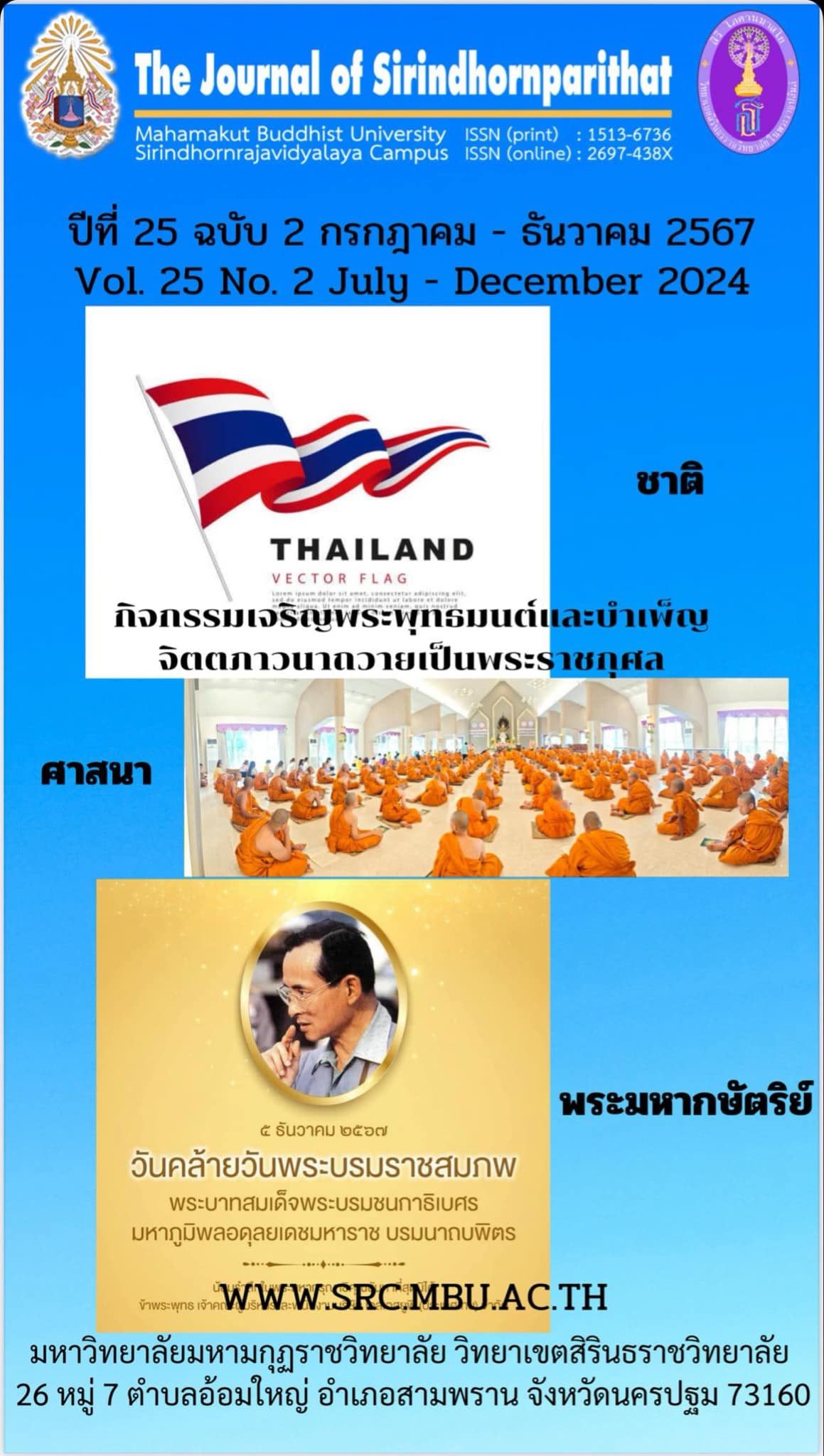A Model of Moral School Management Improvement in Phichit Province under the Secondary Education Service Area Office Phichit
Keywords:
Model, Improvement, Management, Moral SchoolAbstract
The objectives of this research were: 1) to study the status of the moral school management in Phichit Province under the Secondary Education Service Area Office Phichit, 2) to make the moral school management improvement model in Phichit Province, and 3) to evaluate the moral school management improvement model in Phichit Province. This research applied Qualitative Research and Quantitative Research by the in-depth interview from 15 key informants with the Semi-structured Interviews, the focus group discussion with 8 experts by using the focus group record and the content analysis technique for the data analysis, and evaluating the model from 20 key informants with the evaluation forms. The statistics used mean and standard deviation.
The research results were as follow:
1.The status of the moral school management in Phichit Province consisted of 6 aspects: 1) creating the perception and acceptance, 2) creating the master teachers and students, 3) specifying the moral identity of school 4) specifying the ways for accomplishing the moral identity of school, 5) doing for accomplishing the changeable goals, and 6) creating the mechanism for driving the moral schools.
- The moral school management improvement model in Phichit Province consisted of the model of creating the perception and acceptance, creating the master teachers and students, specifying the moral identity of school, specifying the ways for accomplishing the moral identity of school, doing for accomplishing the changeable goals, and creating the mechanism for driving the moral schools.
- 3. The evaluation of the moral school management improvement model in Phichit Province in 4 dimensions: the evaluation of correctness, appropriateness, practicality and utility showed that it was at the highest level.
References
กระทรวงศึกษาธิการ. (2546). พระราชบัญญัติการศึกษาแห่งชาติ พ.ศ. 2542 และแก้ไขเพิ่มเติม (ฉบับที่ 2) พ.ศ. 2545. กรุงเทพมหานคร : โรงพิมพ์องค์การรับส่งสินค้าและพัสดุภัณฑ์.
กฤตเมธ อุ่นโพธิ, สำเนา หมื่นแจ่ม, และคณะ. (2564). สภาพปัญหาการบริหารจัดการโครงการโรงเรียนคุณธรรมของโรงเรียนบ้านหนองเงือก อำเภอป่าซาง จังหวัดลำพูน. บทความวิจัย. การประชุมวิชาการระดับชาติและระดับนานชาติ ประจำปี ๒๕๖๔. สมาคมพัฒนาวิชาชีพการบริหารการศึกษาแห่งประเทศไทย.
คมลิขิต นามไว, ระพีพัฒน์ หาญโสภา และคณะ. (2563). การพัฒนาพฤติกรรมที่พึงประสงค์ของนักเรียนตามคุณธรรมอัตลักษณ์โรงเรียนคุณธรรม. วารสารมหาวิทยาลัยมหามกุฏราชวิทยาลัย วิทยาเขตร้อยเอ็ด, ปีที่ 9 (1), มกราคม – มิถุนายน.
ณัฐพร ส่งศรี และสงวน อินทร์รักษ์. (2562). การบริหารจัดการโรงเรียนคุณธรรมของโรงเรียนกลุ่มเครือข่ายบ้านโป่งที่ ๓. วารสารการบริหารการศึกษา มหาวิทยาลัยศิลปากร, ปีที่ 10 ฉบับที่ 2 (กรกฎาคม – ธันวาคม): 712-724.
นิเวศน์ อุดมรัตน์. (2555). รูปแบบการส่งเสริมคุณธรรมจริยธรรมนักเรียนระดับประถมศึกษา สํานักงานเขตพื้นที่การศึกษานครราชสีมา เขต 2. วารสารศึกษาศาสตร์ มหาวิทยาลัยนเรศวร, ปีที่ 14 ฉบับที่ 1 (มกราคม – เมษายน): 29-30.
พระเทพเวที(ป.อ.ปยุตโต).(2535). การศึกษาที่สากลบนฐานแห่งภูมิปัญญาไทย.กรุงเทพมหานคร : อมรินทร์พริ้นติ้งกรุ๊ฟ.
พระมหารถศรี อินธิสิทธิ์ (ติกฺขปญฺโญ). (2563). การบริหารโครงการโรงเรียนคุณธรรม สพฐ.ต้นแบบ:กรณีศึกษาโรงเรียนในจังหวัดสกลนคร. วิทยานิพนธ์ครุศาสตรมหาบัณฑิต สาขาวิชาการบริหารการศึกษา. บัณฑิตวิทยาลัย มหาวิทยาลัยราชภัฏสกลนคร.
ศรีรักษ์ เรืองรัตน์. (2563). แนวทางการพัฒนาสถานศึกษาสู่มาตรฐานตามโครงการ โรงเรียนคุณธรรม สพฐ. ของโรงเรียนสังกัดส านักงาน เขตพื้นที่การศึกษามัธยมศึกษา เขต 12. วิทยานิพนธ์ครุศาสตรมหาบัณฑิต สาขาวิชาพุทธบริหารการศึกษา. บัณฑิตวิทยาลัย มหาวิทยาลัยมหาจุฬาลงกรณราชวิทยาลัย.
สำนักงานเขตพื้นที่การศึกษามัธยมศึกษาพิจิตร. (2565). แผนปฏิบัติราชการ ประจำปีงบประมาณ พ.ศ. 2565.
สำนักงานคณะกรรมการการศึกษาขั้นพื้นฐาน. (2560). โครงการโรงเรียนคุณธรรม สพฐ., 2560: 1.
สำนักเลขาธิการการศึกษา กระทรวงศึกษาธิการ. แผนการศึกษาแห่งชาติ พ.ศ. 2560-2579: 71.
Downloads
Published
Issue
Section
License
Copyright (c) 2024 Mahamakut Buddhist University

This work is licensed under a Creative Commons Attribution-NonCommercial-NoDerivatives 4.0 International License.
บทความที่ได้รับการตีพิมพ์เป็นลิขสิทธิ์ของ มหาวิทยาลัยมหามกุฏราชวิทยาลัย วิทยาเขตสิรินธรราชวิทยาลัย
ข้อความที่ปรากฏในบทความแต่ละเรื่องในวารสารวิชาการเล่มนี้เป็นความคิดเห็นส่วนตัวของผู้เขียนแต่ละท่านไม่เกี่ยวข้องกับหาวิทยาลัยมหามกุฏราชวิทยาลัย วิทยาเขตสิรินธรราชวิทยาลัย และคณาจารย์ท่านอื่นๆในมหาวิทยาลัยฯ แต่อย่างใด ความรับผิดชอบองค์ประกอบทั้งหมดของบทความแต่ละเรื่องเป็นของผู้เขียนแต่ละท่าน หากมีความผิดพลาดใดๆ ผู้เขียนแต่ละท่านจะรับผิดชอบบทความของตนเองแต่ผู้เดียว




